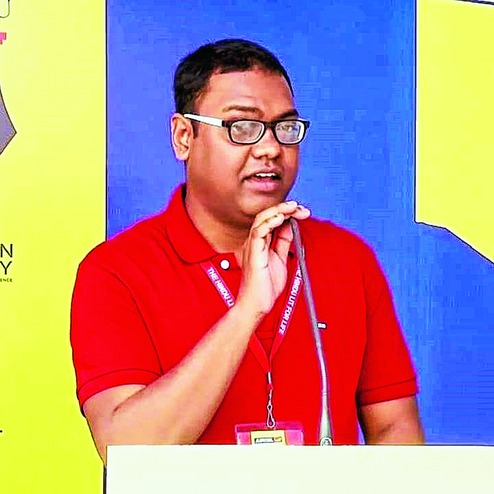
Hansda Sowvendra Shekhar’s views on Santhali script may have triggered salvos at his book
Ranchi, Sept. 3: Protests against Hansda Sowvendra Shekhar's now banned book, The Adivasi Will Not Dance, began, coincidentally, after the author posted on Facebook a year-old article about Ol-Chiki, the standard script accepted by the government of India to write Santhali.
In his article, written originally for a news portal and posted on Facebook on July 17, Hansda suggests that in 1925 Santhal author and linguist Raghunath Murmu, who was from Mayurbhanj in northern Odisha, invented Ol-Chiki, a script that has now been adopted as a standard for writing Santhali.
He provides a few examples, but goes on to add how Ol-Chiki had not reached Santhal Pargana.
On August 11, the state government banned The Adivasi Will Not Dance, a collection of short stories, saying it portrayed Santhalis in a bad light after there were protests about one story in particular. It also suspended the 34-year-old Hansda, a government doctor posted at Pakur, 400km from Ranchi.
Those close to Hansda believe he was being targeted, via his book, because certain sections of tribals were unhappy about his apparent endorsement of Ol-Chiki.
A low-down on the debate that is nowhere near resolution:
What is Ol-Chiki?
It is a Santhali script developed by Raghunath Murmu of Mayurbhanj (Odisha) in 1925. Over time, it gained popularity among Santhals living in Odisha, Bengal and Jharkhand. Earlier, Paul Olof Bodding, a Norwegian missionary who worked in India, primarily in Dumka for 44 years (1889-1933), had introduced a script, that was a modification of the Roman script, for the language. He also used the same script to translate The Bible in 1914
Why are there so many scripts for Santhali?
According to the director of Santali Academy, Sido Kanhu Murmu University-Dumka Sujit Soren, Santhalis are spread across Jharkhand, Bengal, Odisha, Bihar, Assam, Tripura and even across the border in Nepal and Bangladesh. And they all used local scripts. Hence, Santhali was written using Bengali, Devnagri, Odia and Roman scripts.
In Bihar and Jharkhand, both Christian and non-Christian Santhals adopted the Roman script when missionaries introduced it in the 19th century. After Independence, Devnagri was also used in some parts of undivided Bihar and slowly gained root, encouraged by the state government of the time. Both the state and Union public service commissions allow use of these scripts
Why isn't Ol-Chiki widely used even though it is accepted by the Union government?
Mahendra Besra, a writer and professor of Santhali at SP Mahila College in Dumka, says he wasn't opposed to Ol-Chiki in principle although it was yet to fully develop as a script. Hence, many who grew up learning Santhali either in Roman or Devnagri did not find it convenient to switch over to it
What about Santhali literature?
Sahitya Akademi follows one-language, one-script formula and considers Santhali books written in Ol-Chiki for awards, says Bhogla Soren, who won it in 2010 for his Santhali play Rahi Ranwak' Kana
What is the argument in favour of using Roman and/or Devnagri scripts?
Professor Besra maintains Ol-Chiki should be allowed to evolve first. He feels there was no need to impose Ol-Chiki... those who can write Santhali using Devnagri, Bangla or Roman, should continue to do so
Why is it important for Ol-Chiki to flourish?
Its proponents believe it gives a distinct identity to Santhals and their language
Are there religious undertones in the dispute?
Besra believes some sections were trying to promote Ol-Chiki on religious lines as certain sections felt Ol-Chiki was for original Santhalis. This, he says, was hurtful to many Christian Santhals who use Roman or Devnagri
What is the Jharkhand government's stand?
The state is open to use of both Devnagri and Ol-Chiki scripts. State social welfare minister Louise Marandi, who is a professor of Santhali, says there was no need to impose Ol-Chiki. 'Let people choose. I prefer Devnagri, while others have other preferences. So, nothing should be rushed till there is greater acceptance,' she adds.











